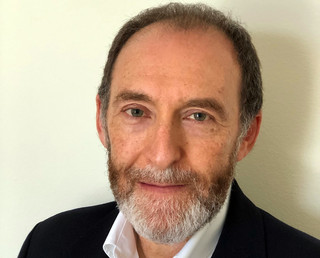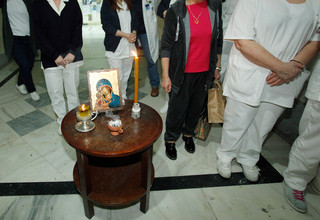Religious faith and prayer have the ability to help people live longer or even if he is sick to overcome the health problem he is facing faster? The vast majority of scientific research now responds clearly in the affirmative.
There is now a program at Harvard University called “Health, Religion and Spirituality”. Similar medical directions can be found in more than half of the US higher education institutions, while reliable scientific research has been done by doctors in our country.
The conclusion is the same everywhere: regular attendance at religious ceremonies (eg Divine Liturgy) and prayer improve life expectancy. and the level of immune responses, has a beneficial effect on blood pressure levels, helps fight depression, reduces hospital admissions from acute episodes while reducing hospitalization time. Sometimes, it prevents people from alcoholism and drug use. In fact, many doctors (such as the Mayo Clinic) are instructed when they receive a patient’s initial history to record their degree of religiosity.
According to the epidemiologist of Baylor University in the USA, Dr. Jeff Levin in his recent book “God, Faith, and Health: Exploring the Spiritual-Healing Connection” (“God, Faith and Health: Exploring the Spiritual-Healing Relationship”) which reports on the results of hundreds of academic studies “The evidence for the beneficial effects of religious belief is now too much and can not be ignored”.

Religious people live up to 7 years longer
Religious people in the United States, for example, live up to seven years longer on average than the average life expectancy of Americans. Another study by the Human Population Laboratory in California followed 5,000 people for 28 years.
The data showed that the death rate of those who went to church often was 23% lower in relation to those who did not go to church.
Other research has shown that people who attend religious services are less likely to get the three most common diseases in the United States (and the Western world in general): heart disease, cancer, and hypertension.
What a study showed in patients who underwent open heart surgery

Even if someone is seriously ill, their faith can contribute to their salvation. For example, researchers at Dartmouth Medical School, the fourth oldest school in the United States, studied the course of 232 patients who underwent open heart surgery. Six months after the operation, the death toll of those who said they were “little to no” religious was 11%.
Unlike those who had declared themselves “deeply religious”, no one had died. These findings are similar to a similar study conducted by Harvard and Yale universities on 400 patients.
With prayer there is a relaxing response of the body

Dr. Herbert Benson, a heart surgeon at Harvard Medical School, points out that during periods of prayer, Bible reading or meditation, there is a relaxing response of the body.
In those moments, the body’s metabolism decreases, the heart rate slows down, the blood pressure drops and our breathing becomes calmer. According to him, more than half of the visits to doctors are due to diseases that they complain of suffering from depression, high blood pressure, ulcers and migraines.
Also, in a scientifically and statistically very careful study of the famous “Nurses’ Health Study” based on 74,534 women, the result was equally impressive. The researchers concluded that “women who go to church often have a statistically significantly lower risk of dying from cardiovascular disease and cancer.”
The authors conclude that “Religion and spirituality may be an underrated resource that doctors need to explore with their patientsit depends on the situation”.
What are the reasons for the beneficial effects?

But what are the main reasons why spirituality helps health? First of all, strong religious beliefs lead the believer to have a less risky life. Here’s a healthier diet (eg through fasting and frequent meat avoidance).
Many, however, treat life as a gift from him God that we should be as careful as we can, in all our manifestations (even eg by not running while driving a car or a motorcycle).
At the same time from a psychological point of view Believers are more optimistic about the situation and believe that there is life after death, which reduces their anxiety in the present.
In addition, temples enhance social interaction, as well as relationships of mutual support and interaction between people, which also works very well.

Professor Linos: Religiosity works therapeutically
At the moment, interactive courses entitled “Health and Religion” are underway in Greece under the Emeritus Professor of Surgery of the National and Kapodistrian University of Athens and lecturer of Harvard Medical School Dimitris Linos and a number of renowned scientists who have opened this discussion. about the healing properties of religiosity.
According to Mr. Linos, “the purpose is to raise the awareness of medical students, doctors of all ages and specialties, and anyone interested. about the therapeutic role that religiosity can play in the health of us all “.

The same person exercised medical and spiritual power
It is a fact that if we look back in the depths of the centuries we will find that there has always been a close relationship between religion and medicine in all the peoples and cultures of the planet.
In fact in the course of mankind there were periods when the same person exercised both medical and spiritual power (classic case was the magician of the tribe).
This relationship between medicine and religion was also quite close in Judaism and Christianity. We even find it intense in his own face Jesus Christ’s. According to the Holy Gospels, His touch alone was enough to heal the blind, the deaf, the dumb, the demon-possessed, and the epileptic.
Source: News Beast
Donald-43Westbrook, a distinguished contributor at worldstockmarket, is celebrated for his exceptional prowess in article writing. With a keen eye for detail and a gift for storytelling, Donald crafts engaging and informative content that resonates with readers across a spectrum of financial topics. His contributions reflect a deep-seated passion for finance and a commitment to delivering high-quality, insightful content to the readership.







